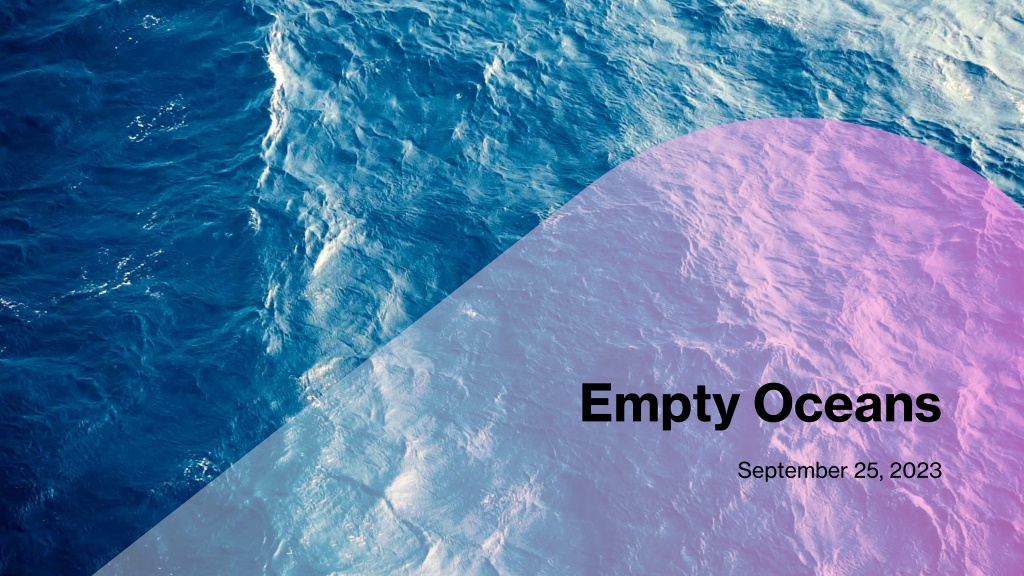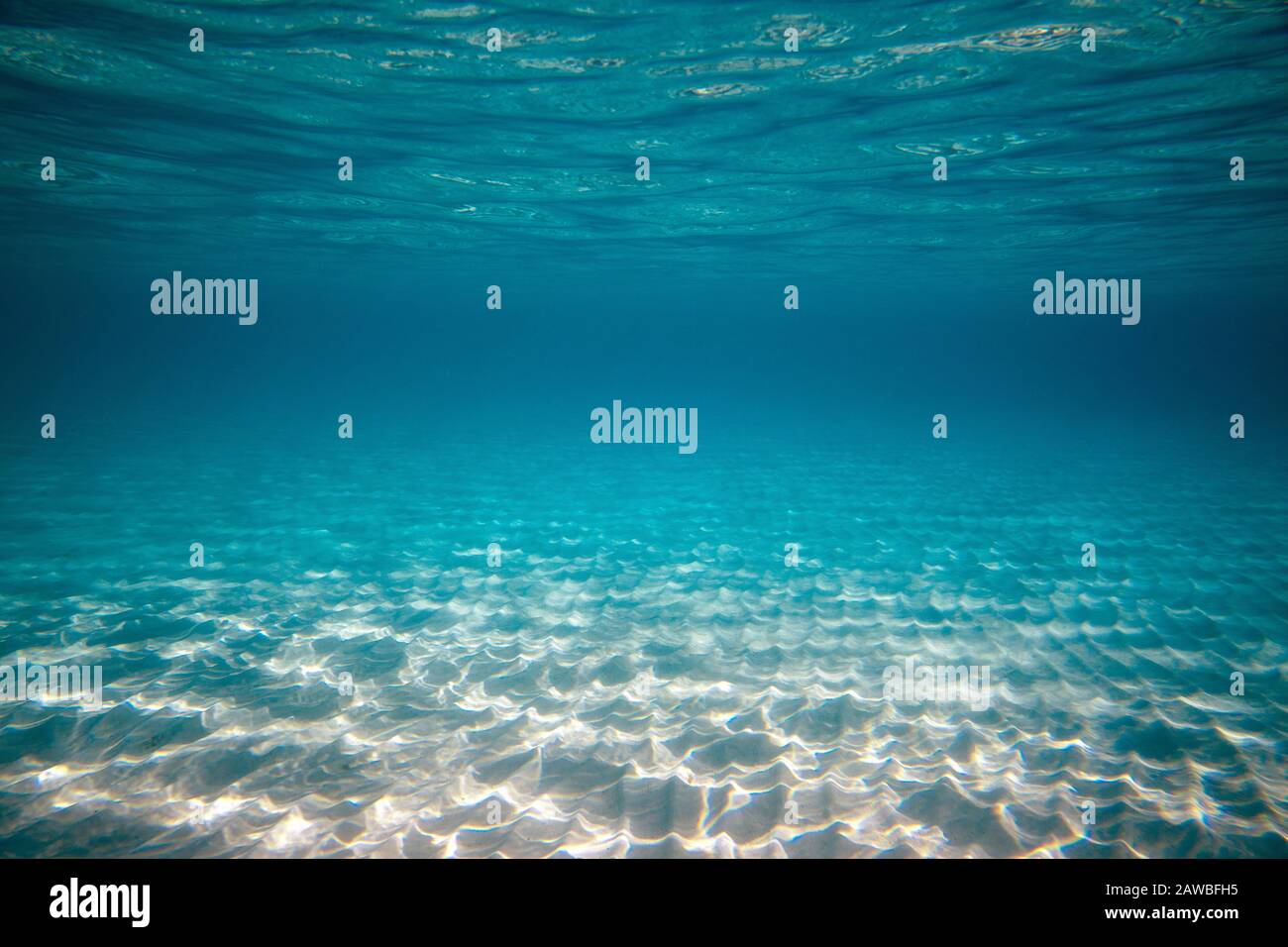Unbelievable Info About What Year Will We See Empty Oceans

The Grim Reality
1. Understanding the Threat
Okay, let's dive right in (pun intended!). The question of "What year will we see empty oceans?" isn't exactly a cheerful one, is it? It's a question that hits you right in the gut, conjuring images of silent, barren waters where vibrant marine life once thrived. Its not something any of us want to think about, but it's a conversation we desperately need to have. So, is the ocean really going to be empty, and if so, when? The short answer? It's complicated, but the gist is that without massive changes, we're heading toward a very, very bad outcome.
What does "empty" even mean in this context? Well, it doesn't mean literally zero fish or marine life. It means a catastrophic decline in biodiversity, a collapse of crucial ecosystems, and an ocean that's essentially incapable of sustaining itself in a healthy way. Imagine a rainforest stripped bare of its trees — you still have dirt, but the vibrant life is gone. That's the kind of "empty" we're talking about. A ghost of its former self, unable to provide for the planet and us.
The problem isn't just overfishing, although that's a huge part of it. We're talking about a confluence of issues all working in concert to decimate marine populations. Think of it as a perfect storm of destruction. Climate change, plastic pollution, habitat destruction, ocean acidification — they're all contributing to the demise of our oceans at an alarming rate. Each issue alone would be a concern, but together, they form a formidable threat we can't ignore.
Now, I know what you're thinking: This all sounds pretty dire. And you're right, it is. But it's not inevitable. We still have time to turn things around, to change course, and to create a better future for our oceans. The key lies in understanding the severity of the situation, taking meaningful action, and holding those in power accountable for their environmental impact. Keep reading, it is not all doom and gloom!

The Usual Suspects
2. The Culprits Behind the Crisis
So, what are the main drivers pushing us toward those potentially empty oceans? Let's break down the key players in this environmental drama. First and foremost, we have overfishing, which is like the obvious villain wearing a black hat. We're taking fish out of the ocean faster than they can reproduce, disrupting the food chain and causing entire populations to collapse. It's like raiding your savings account without ever making deposits — eventually, you're going to run out of money.
Next up is climate change, which is the insidious mastermind pulling the strings behind the scenes. Rising ocean temperatures, caused by greenhouse gas emissions, are wreaking havoc on marine ecosystems. Coral reefs are bleaching and dying, fish are migrating to cooler waters (leaving behind those who can't adapt), and ocean acidification is making it harder for shellfish and other organisms to build their shells. It's like slowly turning up the heat on a pot of boiling water — eventually, everything inside is going to cook.
Then we have plastic pollution, which is like the silent assassin slowly choking the oceans to death. Millions of tons of plastic end up in the ocean every year, where it breaks down into microplastics that are ingested by marine life. This plastic can block digestive tracts, leach harmful chemicals, and generally make life miserable for anything that encounters it. It's like slowly poisoning the well — eventually, everything that drinks from it is going to get sick.
And let's not forget habitat destruction, which is like bulldozing the ocean's apartment buildings. Coastal development, dredging, and destructive fishing practices (like bottom trawling) are destroying critical habitats like mangroves, seagrass beds, and coral reefs. These habitats provide food, shelter, and breeding grounds for countless marine species. It's like tearing down the foundation of a house — eventually, the whole thing is going to crumble.

Projecting the Future
3. Forecasting the Ocean's Fate
Pinpointing an exact year for "empty oceans" is tough because it depends on so many factors. Scientific models offer a range of predictions, and they're not exactly a source of sunshine and rainbows. Some studies suggest that if current trends continue, we could see commercially fishable populations collapse by as early as 2048. Think about that for a moment: just a few decades from now, we might be facing a world where seafood is a luxury few can afford, and entire coastal communities are struggling to survive. Others estimates say even much worse, where the oceans starts to be virtually dead and empty.
However, it's crucial to remember that these are just projections. They're based on current data and assumptions about future behavior. The good news is that we have the power to change those assumptions. If we take decisive action to reduce overfishing, combat climate change, curb plastic pollution, and protect marine habitats, we can push that doomsday scenario further into the future — or even avert it altogether.
The problem with these predictions is they're not guarantees, but warnings. They're like flashing red lights on the dashboard, telling us that something is seriously wrong and that we need to take immediate action. Ignoring them is like driving with your eyes closed — you might get lucky for a while, but eventually, you're going to crash. And in this case, the crash could be catastrophic for the entire planet.
Think of it this way: we're essentially conducting a massive experiment with our oceans, and we're not really sure what the outcome will be. We're pushing the system to its limits, and we're starting to see the warning signs that things are about to break. The question is, are we going to heed those warnings and change our behavior, or are we going to keep driving full speed ahead toward disaster? The choice, ultimately, is ours.

Blank World Map Oceans
Hope Floats
4. Turning the Tide
Okay, enough with the gloom and doom! Let's talk about solutions. Because the truth is, we're not powerless in the face of this crisis. We can all take steps, big and small, to help protect our oceans and prevent them from becoming empty. The first step is education. Learn about the issues, understand the science, and spread the word to your friends and family. Knowledge is power, and the more people who understand the problem, the more likely we are to find solutions.
Next, think about your consumption habits. Are you eating sustainably sourced seafood? Are you reducing your plastic consumption? Are you supporting companies that are committed to environmental responsibility? Every choice we make has an impact, and by making conscious choices, we can help reduce our footprint on the ocean. Think about smaller things too — like using reusable water bottles and shopping bags, avoiding single-use plastics, and properly disposing of waste. Every little bit helps.
Get involved in local conservation efforts. Volunteer at beach cleanups, support organizations that are working to protect marine habitats, and advocate for policies that promote ocean health. Collective action is essential, and by working together, we can make a real difference. Even writing letters to your elected officials, supporting environmental organizations, and participating in peaceful protests can have a significant impact.
And finally, don't lose hope! The challenges we face are significant, but they're not insurmountable. We have the technology, the knowledge, and the resources to turn things around. What we need is the political will and the collective determination to make it happen. Remember, the fate of our oceans is in our hands. Its a shared responsibility, not someone elses problem. By working together, we can create a future where our oceans are thriving, vibrant, and full of life.

PPT Empty Oceans Academic Writing PowerPoint Presentation, Free
Navigating Troubled Waters
5. Delving Deeper into Perspectives
The question of "What year will we see empty oceans?" isn't just a simple yes or no answer. There's a lot of debate among scientists and experts about the exact timeline and the severity of the potential collapse. Some argue that focusing solely on fish populations is too narrow and that we need to consider the entire marine ecosystem, including plankton, invertebrates, and marine mammals. Others emphasize the importance of addressing climate change as the primary driver of ocean decline.
One point of contention is the effectiveness of current conservation efforts. Some argue that they're simply not enough to counteract the scale of the problem, while others point to successful examples of marine protected areas and sustainable fisheries management as evidence that we can make a difference. It's a bit like arguing about whether a bandage is enough to stop a hemorrhage — it might help, but it's not going to solve the underlying problem.
Another area of debate is the role of technology in addressing ocean decline. Some believe that innovations like carbon capture, plastic recycling, and alternative fishing gear can offer solutions, while others worry that relying too heavily on technology could distract us from addressing the root causes of the problem, such as overconsumption and unsustainable practices. Is technology a helpful tool, or a convenient distraction?
The key takeaway is that there's no easy answer to the question of "What year will we see empty oceans?". The future of our oceans depends on a complex interplay of factors, and it's up to us to navigate these troubled waters with knowledge, wisdom, and a commitment to action. We need to listen to the experts, engage in constructive dialogue, and make informed decisions that will protect our oceans for generations to come. The path forward requires constant evaluation, adaptation, and a willingness to challenge our own assumptions.

FAQ
6. Your Questions Answered
Let's tackle some frequently asked questions about the state of our oceans and what the future might hold. We'll try to keep it straightforward!
Q: Is it really possible for the oceans to become completely empty?A: While the term "empty" might be a bit of an exaggeration, the reality is that we could see a drastic decline in marine life, leading to the collapse of ecosystems and the loss of biodiversity. Think of it as a critical system failure, not a complete absence of life.
Q: What's the single most important thing I can do to help protect the oceans?A: Reducing your plastic consumption is huge! But beyond that, educate yourself and others, support sustainable seafood choices, and advocate for policies that promote ocean health. Every action counts!
Q: Are there any success stories in ocean conservation that give us hope?A: Absolutely! There are many examples of successful marine protected areas, sustainable fisheries management programs, and efforts to reduce plastic pollution. These stories show that we can make a difference when we work together.